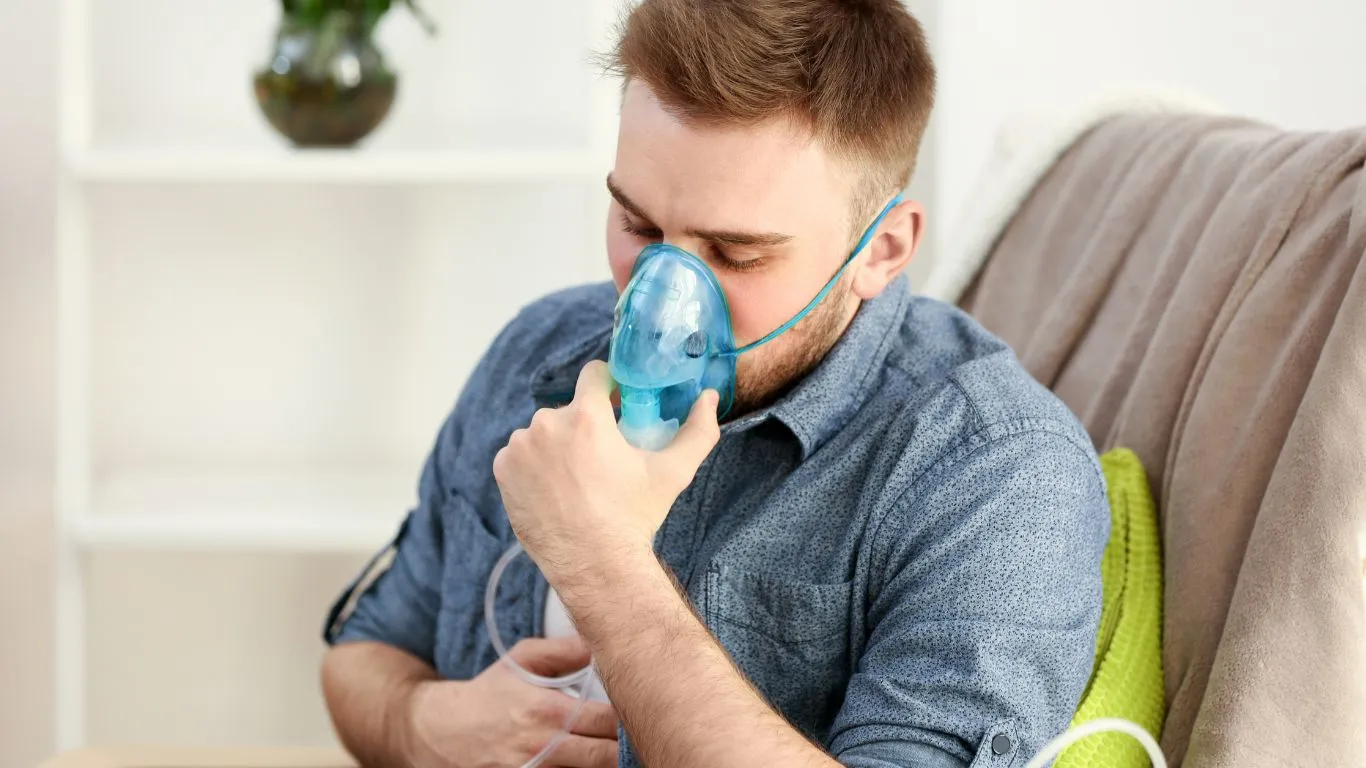Can Asthma Cause Excessive Yawning and Breathlessness? Find Out Now
Ever noticed yourself yawning more than usual, even when you’re not tired? Maybe you’re also feeling out of breath more often than you’d like to admit? If you’re asking yourself, can asthma cause excessive yawning and breathlessness—you’re definitely not alone. As a Pulmonary Nurse, I’ve seen this question come up more times than I can count, especially among people who don’t even realize they could be dealing with a respiratory issue. It’s one of those things that people chalk up to being tired, stressed, or just “off,” but there’s often more going on beneath the surface.
What’s the Deal With Yawning and Breathing Trouble?

Let’s be real—yawning isn’t exactly something we associate with lung issues. Most folks think of it as a sleep thing, right? But what if I told you your body might be trying to compensate for a lack of oxygen when you’re constantly yawning? That deep, involuntary inhale? It’s your lungs screaming, “Hey, give me more air!”
In the world of pulmonary health, we sometimes refer to this as a form of air hunger. It’s super common in people who are struggling with asthma, especially the kind that isn’t well-controlled. When the airways are tight or inflamed, your lungs can’t move air as freely, which can trick your brain into thinking you’re not getting enough oxygen—even if your oxygen levels are technically fine.
Breaking Down the Science of It All
Asthma causes inflammation and narrowing in the airways, and when that happens, it’s harder for air to get in and out. You might not always notice full-on wheezing or coughing. Instead, you might just feel like you’re taking shallow breaths or not getting that satisfying deep breath you’re craving. That leads to—you guessed it—yawning and a constant need to “catch your breath.”
From a clinical standpoint, here’s what might be going on in your body:
- Bronchoconstriction: Airways narrow, reducing airflow and making it hard to breathe.
- Mucus build-up: That sticky stuff can clog up your airways and increase resistance.
- Inflammation: Swollen airways are less flexible and more reactive to triggers.
- Overactive respiratory drive: Your brain responds to perceived oxygen deprivation by increasing your urge to breathe—hello, yawning!
Not All Asthma Symptoms Are Loud and Obvious

Here’s where it gets tricky—many people don’t associate subtle symptoms like yawning or mild breathlessness with asthma. When we think asthma, we picture someone huffing through an inhaler or having a full-blown attack. But in reality, asthma can be a sneaky little thing.
In my years working in pulmonary care, I’ve had patients come in complaining of “weird fatigue,” or “just feeling like they can’t take a full breath.” They never considered asthma until we dug a little deeper. Often, they had what we call cough-variant asthma or silent asthma—types that don’t always come with the usual whistles and wheezes.
Common but Overlooked Signs of Asthma
Let’s talk about some red flags that often fly under the radar:
- Excessive yawning—especially when you’re not even tired
- Shortness of breath during light activity (walking, climbing stairs)
- Chest tightness that comes and goes
- Frequent sighing or deep breaths
- Feeling winded for no reason
Sometimes, these signs appear more during specific times—like early mornings or at night, or after being exposed to triggers like cold air, dust, or even strong emotions. That’s why it’s so important not to brush them off.
When Yawning Becomes a Symptom

This is something I often bring up with patients: if you find yourself yawning more than usual and feeling breathless—especially during moments of rest or light activity—it might be time to look into your respiratory health. One of my patients, a young woman in her 30s, thought she was just tired from work stress. Turns out, she had mild intermittent asthma that wasn’t being managed properly. Once we got her on the right treatment, those “random yawns” almost completely disappeared.
How Your Body Tries to Compensate
Think of it like this—when your airways are constricted, you’re not exchanging air efficiently. Your oxygen and carbon dioxide balance is off. So, the body makes you yawn or sigh as a way to “reset” your breathing rhythm and draw in more oxygen. It’s your internal alarm system saying, “Hey! Something’s off.”
What’s wild is that even people with otherwise healthy lungs can experience this if they’re exposed to asthma triggers or if they’ve got undiagnosed mild asthma. So yeah, asthma can cause excessive yawning and breathlessness, and it’s way more common than most people think.
Digging Deeper: Why Does Asthma Mess With Breathing Patterns?

Alright, let’s go a little deeper here. We’ve already touched on how asthma can cause excessive yawning and breathlessness, but what’s actually happening inside your body when this goes down? I like to explain this to my patients in simple terms—think of your lungs like a sponge and your airways like little straws. Now imagine trying to breathe through a straw that’s halfway pinched. Not fun, right?
When you have asthma, your body goes into this weird, overprotective mode. Triggers—like pollen, pet dander, cold air, or even strong emotions—cause your airways to tighten up, swell, and start producing extra mucus. Your lungs end up working overtime just to do something as basic as breathing.
The Oxygen Exchange Struggle
So, what does that have to do with yawning and feeling breathless? It’s all about the oxygen-carbon dioxide exchange. When your airways are inflamed or obstructed, less air reaches the alveoli (those tiny air sacs where gas exchange happens). Your body senses this drop in effective oxygen intake, even if your blood oxygen level still looks okay on paper.
To compensate, your brain sends signals to breathe deeper, more frequently—hence, the yawning. It’s a subconscious effort to pull in more oxygen and stabilize things. But if the underlying cause (asthma) isn’t addressed, this can become a daily struggle.
Day-to-Day Triggers That Make Things Worse

Here’s the kicker—sometimes it’s not even full-blown asthma attacks that cause the breathlessness and yawning. A lot of the time, it’s chronic exposure to low-level triggers that chip away at your breathing quality. I’ve had patients who started yawning excessively after switching to a new laundry detergent or moving into an apartment with poor air circulation. Wild, right?
Some Sneaky Everyday Triggers Include:
- Dust and mold – even in clean homes, they hide in vents and carpets
- Pet dander – especially from cats and dogs
- Perfumes and aerosols – body sprays, cleaning products, candles
- Cold air – one of the most underrated triggers
- High humidity or dry air – extremes in air moisture make airways reactive
These things might seem harmless, but for someone with asthma (or even undiagnosed asthma), they can slowly nudge your lungs into distress mode. And one of the earliest signs? That odd, frequent yawning.
When Breathlessness Isn’t Just Physical

Let me throw something else into the mix—anxiety. Yep, mental health plays a huge role in how we breathe. I’ve had patients tell me, “I can’t tell if it’s asthma or a panic attack.” And honestly, sometimes the symptoms overlap so much it’s hard to tell without digging into their history and doing a proper workup.
Here’s the thing—if your breathing feels restricted, you start to panic. If you panic, your breathing gets even more shallow and rapid. It becomes a vicious cycle. And you know what sneaks in? More yawning. It’s the body’s way of trying to calm itself down and get that much-needed oxygen boost.
Learning to Differentiate the Signs
If you find yourself thinking, “Am I yawning because I’m tired, anxious, or because something’s wrong with my lungs?”—you’re not crazy. It’s a legit question. Here’s a quick breakdown I share with folks who are stuck in that confusion:
- Asthma-related yawning: Often paired with tightness in the chest, mild wheezing, or breathlessness during basic tasks.
- Anxiety-induced yawning: Tends to come with a racing heart, restlessness, and a sense of dread or unease.
- Fatigue yawning: Usually comes and goes with your energy levels and doesn’t hang around all day.
Of course, sometimes it’s a mix of two or all three. That’s why context is key—and honestly, that’s where a proper medical evaluation really helps.
What I’ve Learned from My Patients
Over the years, one thing that’s stood out to me is how dismissed people feel when they first bring up these symptoms. I’ve had patients tell me other doctors wrote it off as “just stress” or “not sleeping enough.” And sure, sometimes that’s true—but not always. It’s why I always ask about how you’re yawning, when it happens, and what else is going on with your body.
One of my favorite patients—a middle-aged teacher—kept saying she felt like she “couldn’t catch her breath,” especially during meetings or after climbing stairs. Her primary doctor brushed it off. We ran a simple spirometry test and boom—undiagnosed mild asthma. A low-dose inhaler changed her life. No more yawning marathons during parent-teacher conferences!
Why Listening to Your Body Matters
If there’s one thing I always emphasize, it’s this: your body whispers before it screams. Excessive yawning and breathlessness may not seem like red-alert symptoms, but they’re often the early signals of something deeper. You don’t have to be wheezing or gasping to have your asthma show up in sneaky, quiet ways.
And from a nursing perspective, I can’t stress enough how important it is to track patterns. Keep a simple log. Note when you yawn the most, what you were doing before it happened, and whether there were any environmental or emotional triggers. You’d be surprised how much that info can help when you’re trying to get to the root of the issue.
How to Tell if Your Yawning and Breathlessness Is Asthma-Related

By now, we’ve established that asthma can cause excessive yawning and breathlessness, but how can you actually tell if asthma is the culprit—or if something else is going on? In my experience as a Pulmonary Nurse, the most powerful tool is self-awareness mixed with a little bit of detective work.
If you’re noticing a pattern—maybe the yawning hits when you’re outdoors, after cleaning your home, or right after climbing stairs—that’s your clue. Most asthma symptoms flare up in response to specific triggers, so identifying those can be a game changer. I’ve walked countless patients through this exact process, and it often leads to “aha” moments that finally connect the dots.
Simple At-Home Checks You Can Try
- Peak Flow Monitoring: Grab a peak flow meter and track your lung function throughout the day. If your readings drop during episodes of yawning or breathlessness, that’s a red flag.
- Breath-hold Test: Try holding your breath for 15–20 seconds. If you can’t do it without feeling extremely uncomfortable or gasping afterward, your breathing might not be as effective as it should be.
- Symptom Journaling: Track your environment, activity, and how you’re feeling. You’d be amazed how many patients come back with clear trends after just a week of doing this.
And of course, none of these replace professional testing like spirometry or a methacholine challenge—but they’re solid starting points for having a productive convo with your healthcare provider.
Steps You Can Take to Breathe Easier

When I talk to patients who are dealing with unexplained yawning and mild shortness of breath, my first instinct isn’t to rush into heavy medications. It’s to look at their daily routine, environment, and habits first. Sometimes the fix is simpler than expected.
Here’s what I usually recommend:
- Use an Air Purifier: Especially if you live in a city or with pets. Cleaner air = happier lungs.
- Keep a Rescue Inhaler Handy: If you’ve already been diagnosed with asthma, having one nearby can quickly relieve that breathless feeling.
- Mind Your Triggers: Track and minimize exposure to anything that consistently worsens your symptoms—whether it’s dust, smoke, or stress.
- Breathing Exercises: Try pursed-lip breathing or diaphragmatic breathing. These help reset your respiratory rhythm and reduce air hunger.
- Get Evaluated: If you haven’t had formal lung testing yet, make that appointment. The peace of mind alone is worth it.
And for those who are already diagnosed with asthma—if you’re still yawning excessively or feel breathless often, your treatment plan might need a tune-up. Asthma evolves over time, and your meds might not be hitting the mark anymore. Don’t be afraid to check in with your pulmonologist or primary care doc.
What You Shouldn’t Ignore
Look, I get it—yawning seems so harmless. But when it’s happening all the time and is paired with even the slightest breathing difficulty, it deserves your attention. Some folks ignore it for months, even years, because they don’t want to seem dramatic or “make a fuss.” But listen, you’re not being dramatic—you’re being smart by tuning in.
I once had a young athlete come in for what he thought was simple exercise fatigue. He was a frequent yawner and felt a bit winded, but he powered through it until one day during a game, he couldn’t catch his breath at all. Turns out, he had exercise-induced bronchoconstriction, a type of asthma that only shows up with physical activity. Once we figured it out, a pre-workout inhaler completely turned things around for him.
Point is: Don’t wait until you can’t breathe to ask questions about your breathing.
Final Tips From My Nursing Clipboard
- Hydration helps. Dry airways are more reactive. Keep sipping water throughout the day.
- Sleep matters. Poor sleep can make yawning worse and aggravate asthma symptoms.
- Don’t self-diagnose, but do self-advocate. Your gut instinct that something’s off is valid.
Even if the tests come back “normal,” you deserve to feel confident in your breathing and energy levels. And if asthma is part of the picture, early intervention can truly change your quality of life.
References
- Centers for Disease Control and Prevention
- American Lung Association
- Mayo Clinic
- National Heart, Lung, and Blood Institute
- WebMD
Disclaimer
This article is for informational purposes only and is not a substitute for professional medical advice, diagnosis, or treatment. Always seek advice from your physician or other qualified healthcare provider with any questions you may have regarding a medical condition. Never disregard professional medical advice or delay seeking it because of something you have read here.

Bianca Nala is a compassionate Nurse Practitioner with a strong background in primary and respiratory care. As a health writer for Healthusias.com, she combines her clinical expertise with a talent for clear, relatable storytelling to help readers better understand their health. Bianca focuses on topics like asthma, COPD, chronic cough, and overall lung health, aiming to simplify complex medical topics without losing accuracy. Whether she’s treating patients or writing articles, Bianca is driven by a single goal: making quality healthcare knowledge accessible to everyone.






